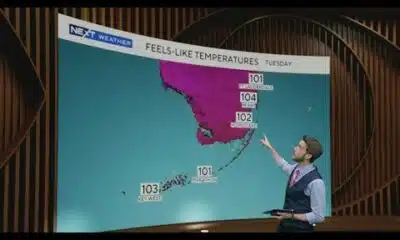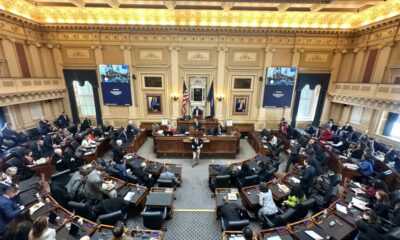News from the South - West Virginia News Feed
As bird flu spreads, feds might undercut states by firing scientists, removing data
As bird flu spreads, feds might undercut states by firing scientists, removing data
by Nada Hassanein, West Virginia Watch
February 27, 2025
As bird flu cases inundate more poultry and dairy farms, state officials worry that the Trump administration’s firings of federal scientists and other actions will undermine efforts to track the virus and protect Americans.
Last week, the U.S. Department of Agriculture rushed to rehire workers who were involved in responding to the outbreak and were fired amid federal workforce cuts. These employees were part of a federal network that oversees labs responsible for collecting samples and confirming H5N1 tests.
State officials also fear funding cuts will hamper those federal labs, and say that by scrubbing some public health data from government websites, the administration may complicate efforts to track the outbreak.
Federal labs are “key for us to be able to do our work, and we need to make sure those labs stay funded, or we can’t do what we do,” said Dr. Amber Itle, the state veterinarian for Washington state. Itle said federal money pays for most of her office’s bird flu efforts, and that the nation’s bird flu surveillance system — one of the most robust in the world — needs to stay in place.
President Donald Trump’s budget cuts and firings include thousands of terminations across the federal Centers for Disease Control and Prevention, the National Institutes of Health and the U.S. Department of Health and Human Services, among others. While the USDA scrambled to rehire its workers, public health experts say federal agencies often work in tandem to respond to health emergencies.
A dozen probationary employees also were let go this month at the Manhattan, Kansas-based National Bio and Agro-Defense Facility, a USDA spokesperson told Stateline. The federal facility works closely with the USDA and aims to protect agricultural systems against animal diseases. The spokesperson said these positions were administrative and “not deemed essential to the functions of the lab.”
“When we start to take away resources that we need to support animal health response, that ultimately could threaten public health,” Itle said, “because if we can’t find it in animals, we could be exposing people without knowing it.”
The Trump administration initially removed reams of public health data related to poverty, pollution, HIV and other sexually transmitted diseases, adolescent health, racial inequities, sex, gender and LGBTQ+ people from federal agency websites. Some of the data was quickly restored. But Washington state health officials said they are downloading bird flu-related information in case it disappears.
Michael Crusan, a spokesperson for the Minnesota Board of Animal Health, compared state-federal bird flu cooperation to a dance.
“You can’t swing dance without a partner,” Crusan said. “So how are we supposed to keep this process running smoothly?”
70 human cases
The highly pathogenic avian influenza virus, known as H5N1, has killed millions of wild birds and has led to emergency culling of commercial flocks.
Nationwide, there have been 70 confirmed human cases since 2024, according to the CDC. Most of these cases have been among farmworkers, who are in daily close contact with poultry and cattle.
California has tracked the most cases, with 38 patients, nearly all exposed to the virus from dairy herds, followed by Washington state with 11 cases. Other infections in humans have been confirmed in Colorado, Iowa, Louisiana, Michigan, Missouri, Nevada, Oregon, Texas and Wisconsin.
In recent weeks, Ohio and Wyoming reported their first human cases of the virus. A CDC study found cases among three dairy veterinarians, with one working in a state that had no infected cattle.
In January, a patient in Louisiana died after contracting the virus, the first human death from bird flu. The patient was an older adult with underlying medical conditions, and had contracted the virus after exposure to a backyard flock and wild birds.
Hospitalization remains rare. For now, bird flu doesn’t easily infect humans and doesn’t spread from person to person, health experts say. The CDC says there is little risk to the general public, but that could change as the virus mutates and continues to infect mammals such as cattle. The virus also has been found in domestic cats.
The more mammals it infects, the more chances it has to adapt to mammals.
– Dr. Amesh Adalja, infectious disease physician and scholar, Johns Hopkins Center for Health Security
To eradicate bird flu, experts are emphasizing comprehensive case surveillance, testing and an overall public health strategy that recognizes the interdependence of humans, animals and the environment.
“You can’t have healthy humans without healthy animals, wild and domestic, and healthy environments,” said Maurice Pitesky, a food security expert at the University of California, Davis School of Veterinary Medicine. “Ultimately, you’re trying to reduce the potential of the virus to move from those wild waterfowl to those farm animals.”
Dr. Amesh Adalja, an infectious disease physician and scholar at the Johns Hopkins Center for Health Security, said the pressure is mounting to safeguard farms.
“The longer this virus circulates on farms, especially infecting dairy cattle and exposing humans that work on those farms, the more chances it has to evolve to something that is more dangerous for humans,” Adalja said.
The virus has been detected in more than 200 mostly wild and feral mammals in the U.S. since 2022. Those mammals may have become infected from eating fresh wild bird carcasses, but there is no indication of transmission from mammal to mammal, experts say.
A recent CDC study found cases in two indoor cats belonging to dairy farmworkers. Other infections in cats have been linked to raw pet food. Officials are urging people to refrain from drinking raw milk and from feeding dogs and cats raw pet food.
“The more mammals it infects,” Adalja said, “the more chances it has to adapt to mammals.”
All 50 states
More than 166 million birds across all 50 states have been infected nationwide since 2022, according to CDC data as of Tuesday. Over the past month, the virus has been detected in 86 commercial flocks and 51 backyard flocks. Infected poultry flocks must be culled when an outbreak occurs. In groceries nationwide, egg prices have surged amid the shortages.
The virus is also suspected in recent die-offs of wild birds. In five Michigan counties as of mid-February, more than 300 dead wild birds, including geese and mallard ducks, have been found, the state Department of Natural Resources reported. The department has issued guidance on how waterfowl hunters and property owners can stay safe when encountering dead birds.
Melinda Cosgrove, laboratory scientist manager at the department’s Wildlife Health Section, said her state’s confirmed positive cases are mostly in poultry flocks. To stay abreast of potential cases in the wild, the state has an “Eyes in the Field” webpage by which residents can report sick or dead wildlife to help the department track potential cases.
Those migratory birds are behind the spread across farms, said Kevin Snekvik, executive director of the Washington Animal Disease Diagnostic Laboratory. “Birds migrating north and south up to Alaska, they’re the culprits,” said Snekvik, who is also a professor at Washington State University’s Department of Veterinary Microbiology and Pathology.
States have also been monitoring changes in bird flu patterns by tracking the virus in wastewater. The U.S. has long avoided vaccination of poultry because many of its trading partners will not import vaccinated birds. But federal officials earlier this month gave conditional approval of an updated version of a previous vaccine to protect poultry against the H5N1 virus.
Farmworker testing
In Nevada, a recent spillover to dairy cattle of a specific H5N1 genotype previously found in birds was detected in a milk sample, officials announced earlier this month.
Seventeen states have reported outbreaks in dairy cows. Cows usually recover from the virus, but cattle must be isolated when the virus is detected to prevent further spread. It can be spread to humans through close contact.
Despite the widespread cases in dairy farms, not all states have joined a federal-state partnership to test milk. Currently, 36 states test under the surveillance strategy.
Helping dairy and poultry farmworkers get tested is important for public health response. But many farmworkers are immigrants with no sick leave and who may speak primarily Indigenous languages or Spanish. The Trump administration’s deportation efforts have caused further reticence to report symptoms, said Laura-Anne Minkoff-Zern, a food systems scholar and human geographer at Syracuse University who studies agricultural labor.
“You have a population of workers who don’t have access to health care to begin with,” she said, noting how many dairy farm laborers live in rural or remote places far from city centers. “You have this geographical barrier. You have a linguistic barrier. You have a cultural barrier. And then, of course, today, you have on top of it a lot of fear.”
Since dairy cattle infections were first detected in California in September 2024, the state’s Animal Health and Safety Lab, the only lab in the state handling the most dangerous samples, has received between 400 and 2,000 samples weekly, lab director Ashley Hill wrote in an email to Stateline.
The lab currently has just five technicians authorized to do most of the testing and a handful of support staff who can chip in. Lab technicians are set to strike this week along with university health care, research and technical professionals across the state, according to the union, which represents 20,000 workers.
GET THE MORNING HEADLINES.
West Virginia Watch is part of States Newsroom, a nonprofit news network supported by grants and a coalition of donors as a 501c(3) public charity. West Virginia Watch maintains editorial independence. Contact Editor Leann Ray for questions: info@westvirginiawatch.com.
The post As bird flu spreads, feds might undercut states by firing scientists, removing data appeared first on westvirginiawatch.com
News from the South - West Virginia News Feed
Lower Mud River Project signed and approved in Milton
SUMMARY: The City of Milton, plagued by severe flooding for over a century, is set to build a 1.5-mile, 19-foot-high urban levy to mitigate flood risks. This key project, signed today by West Virginia Governor Patrick Moresy and local leaders, will protect over 600 buildings, enhance public safety, and include flood walls, pond relocations, and pump stations. Construction is planned from 2028 to 2032, with design and survey work ongoing. Mayor Shane Evans emphasized ending residents’ long-standing fear of floods. While traffic impacts remain unclear, officials highlight the extensive preparations ahead to safeguard Milton’s community.
Lower Mud River Project signed and approved in Milton
For more Local News from WSAZ: https://www.wsaz.com/
For more YouTube Content: https://www.youtube.com/channel/UCrcuU0JXXy8oIBqEB13mrwA
News from the South - West Virginia News Feed
WEEKEND WEATHER AUGUST 10TH
SUMMARY: Weekend Weather August 10th forecast for Appalachia calls for another hot day with mostly dry conditions currently. Temperatures are around 77 to 81 degrees but expected to rise through the week. Overnight lows will drop to the 60s with fog developing in river valleys. Rain chances start tomorrow afternoon, with scattered showers and thunderstorms likely, especially Wednesday which has the highest rain chance. Humidity will increase, making it uncomfortably muggy. Stay hydrated and prepared for daily rain showers that should help cool things down. The West Virginia State Fair will experience warm, humid weather with intermittent rain throughout the week ahead.
FOLLOW US ON FACEBOOK AND TWITTER:
https://facebook.com/WOAYNewsWatch
https://twitter.com/WOAYNewsWatch
News from the South - West Virginia News Feed
Ravenswood Red Devils looking for a comeback season in 2025
SUMMARY: The Ravenswood Red Devils aim for a comeback in 2025 after a winless 2024 season. Under second-year coach Matt Perry, the team has embraced a more comfortable environment with a full offseason of weight training and player development. Returning key players like quarterback Owen Curtis and versatile Jacob Simmons boost optimism, alongside eight or nine defensive starters. Perry focuses on restoring tradition, reintroducing black helmets and classic uniforms. Players appreciate Perry’s relatable yet serious coaching style, which elevated the program’s weightlifting and overall effort. The Red Devils open their season on August 22, facing Saint Mary’s in a key early matchup.
Last year the Ravenswood Red Devils endured a winless season. Now the Red and Black have turned the page, going back to …
-
News from the South - Oklahoma News Feed3 days ago
Former payroll director ordered to prison, must repay district nearly $500,000
-
News from the South - North Carolina News Feed6 days ago
Two people unaccounted for in Spring Lake after flash flooding
-
News from the South - Texas News Feed4 days ago
Jim Lovell, Apollo 13 moon mission leader, dies at 97
-
News from the South - Tennessee News Feed5 days ago
Trump’s new tariffs take effect. Here’s how Tennesseans could be impacted
-
News from the South - Missouri News Feed4 days ago
Man accused of running over Kansas City teacher with car before shooting, killing her
-
News from the South - Oklahoma News Feed6 days ago
Tulsa, OKC Resort to Hostile Architecture to Deter Homeless Encampments
-
News from the South - Louisiana News Feed6 days ago
Drugs, stolen vehicles and illegal firearms allegedly found in Slidell home
-
News from the South - Virginia News Feed7 days ago
Virginia House in the balance: 5 key races to watch this fall









































